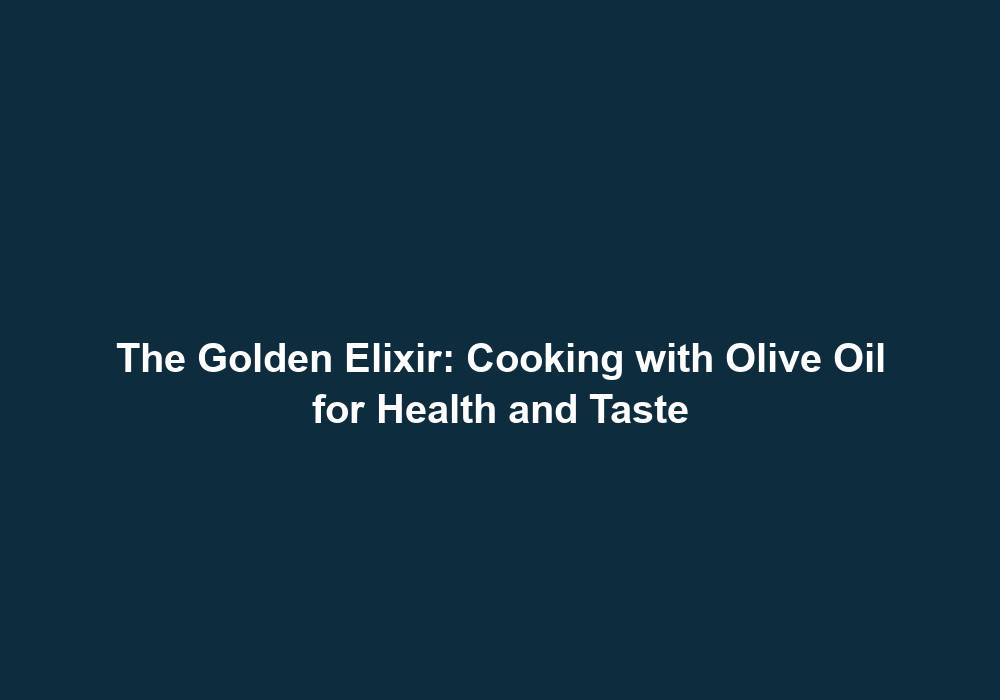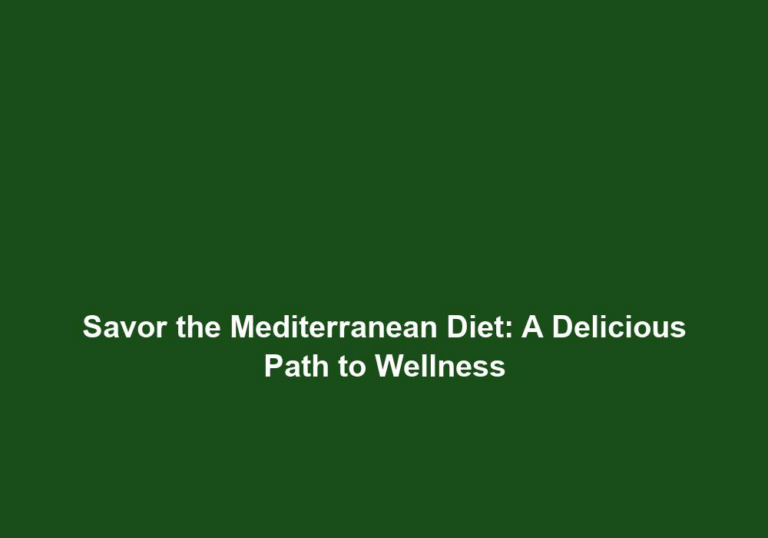The Golden Elixir: Cooking with Olive Oil for Health and Taste
Cooking with olive oil has been a tradition for centuries, and for good reason. Not only does it add a delicious flavor to dishes, but it also offers numerous health benefits. Olive oil is considered one of the healthiest oils available, thanks to its rich nutrient profile and unique composition. In this article, we will explore the wonders of olive oil and how it can enhance both the taste and health benefits of your favorite dishes.
The Nutrient Powerhouse
Olive oil is derived from the fruit of the olive tree, scientifically known as Olea europaea. It is primarily composed of monounsaturated fats, which are considered heart-healthy fats. These fats help reduce bad cholesterol levels, lower the risk of heart diseases, and improve overall cardiovascular health. Incorporating olive oil into your cooking can be a simple yet effective way to promote a healthy heart.
In addition to being a good source of healthy fats, olive oil is also rich in antioxidants, particularly vitamin E and phenolic compounds. Antioxidants play a crucial role in protecting the body against oxidative stress and free radicals, which can contribute to chronic diseases such as cancer and inflammation. Including olive oil in your diet can provide a natural source of these powerful antioxidants, bolstering your body’s defense mechanisms.
Furthermore, olive oil contains other essential nutrients, including vitamin K and vitamin E. Vitamin K is important for blood clotting and bone health, while vitamin E is known for its skin-nourishing properties. By using olive oil in your cooking, you can not only enhance the taste of your dishes but also boost your nutrient intake.
Cooking with Olive Oil: Tips and Recommendations
When it comes to cooking with olive oil, there are a few things to keep in mind to ensure you enjoy its full benefits. Here are some tips and recommendations:
1. Choose Extra Virgin Olive Oil (EVOO)
Extra virgin olive oil (EVOO) is the highest quality and least processed form of olive oil. It is obtained through a cold-pressing technique, preserving the natural flavors and nutrients. EVOO has a low acidity level and is rich in aroma, taste, and antioxidants. It is ideal for drizzling over salads, dipping with bread, or adding a finishing touch to cooked dishes.
When selecting EVOO, look for reputable brands or local producers that adhere to high-quality standards. The label should indicate that it is “extra virgin” and mention the region or country of origin. By choosing high-quality EVOO, you can ensure that you are getting the most flavor and health benefits from your olive oil.
2. Use Olive Oil for Medium to Low Heat Cooking
Olive oil has a smoke point, which is the temperature at which it starts to break down and smoke. Extra virgin olive oil has a lower smoke point compared to refined olive oil. It is best to use olive oil for medium to low heat cooking methods such as sautéing, baking, or roasting. For high-heat cooking methods like deep frying, it is advisable to use oils with higher smoke points.
When cooking with olive oil, it is important to monitor the heat to prevent it from reaching its smoke point. Heating olive oil beyond its smoke point can lead to the formation of harmful compounds and a loss of its beneficial properties. By using olive oil for medium to low heat cooking, you can preserve its flavor and nutrients while enjoying its health benefits.
3. Enhance Flavors with Infused Olive Oils
Infused olive oils can add a burst of flavor to your dishes. These oils are created by infusing herbs, spices, or fruits into the olive oil, resulting in a unique and aromatic taste. Popular infused olive oil varieties include garlic, rosemary, chili, lemon, and basil. Experimenting with different flavors can elevate the taste of your meals and make cooking an enjoyable experience.
To create infused olive oils at home, you can simply add your desired herbs, spices, or fruits to a bottle of olive oil and let it infuse for a few weeks. The longer the infusion time, the stronger the flavor. Alternatively, you can also find a variety of pre-made infused olive oils available in stores. These infused oils can be used in dressings, marinades, or as a finishing touch to your dishes.
4. Store Olive Oil Properly
To preserve the quality and taste of your olive oil, it is essential to store it properly. Olive oil should be kept in a cool, dark place away from direct sunlight and heat sources. Exposure to light and heat can cause the oil to deteriorate more quickly. Additionally, make sure to seal the bottle tightly to prevent oxidation. Proper storage will help maintain the freshness and nutritional properties of your olive oil.
Consider transferring your olive oil to a dark glass bottle or container to protect it from light. If you buy olive oil in bulk, store the larger container in a cool pantry or cupboard and refill a smaller bottle for everyday use. It is important to note that olive oil does have a shelf life, so it is recommended to consume it within a year of purchase for optimal quality.
The Health Benefits of Olive Oil
In addition to its culinary uses, the consumption of olive oil has been associated with a range of health benefits. Let’s explore some of the remarkable advantages of incorporating olive oil into your diet:
1. Heart Health
As mentioned earlier, olive oil’s high content of monounsaturated fats has been linked to numerous cardiovascular benefits. Regular consumption of olive oil has been shown to lower blood pressure, reduce LDL (bad) cholesterol levels, and decrease the risk of heart disease. Including olive oil as a primary fat source in your diet can significantly contribute to heart health.
Moreover, the antioxidants found in olive oil can help prevent the oxidation of LDL cholesterol, which is a key step in the development of heart disease. By reducing LDL oxidation, olive oil can help maintain the health of your arteries and promote better cardiovascular function.
2. Anti-Inflammatory Properties
Chronic inflammation is a common factor in many diseases, including arthritis, diabetes, and certain types of cancer. The antioxidants found in olive oil, particularly the phenolic compounds, have potent anti-inflammatory effects. Incorporating olive oil into your meals can help combat inflammation and potentially reduce the risk of developing chronic diseases.
In addition to its antioxidant properties, olive oil contains oleocanthal, a natural compound that has been shown to have anti-inflammatory effects similar to ibuprofen. This compound can help alleviate symptoms of inflammation and provide relief for conditions such as arthritis. By including olive oil in your diet, you can support your body’s natural anti-inflammatory processes and promote overall well-being.
3. Digestive Health
Olive oil has long been recognized for its beneficial effects on digestive health. It can help stimulate the production of digestive enzymes, improve bile secretion, and enhance overall digestion. Additionally, the monounsaturated fats in olive oil can promote healthy gut bacteria and support the absorption of essential nutrients from your food.
The consumption of olive oil has been associated with a reduced risk of digestive disorders such as gallstones and gastric ulcers. The anti-inflammatory properties of olive oil can also help soothe the digestive system and alleviate symptoms of conditions like irritable bowel syndrome (IBS). By incorporating olive oil into your cooking, you can support a healthy digestive system and improve nutrient absorption.
4. Skin and Hair Benefits
The antioxidants present in olive oil can provide a range of benefits for your skin and hair. Applying olive oil topically can help moisturize the skin, improve elasticity, and reduce the signs of aging. It can also add shine and nourishment to your hair when used as a natural conditioner or hair mask.
Olive oil is rich in vitamin E, which is known for its skin-nourishing properties. Vitamin E helps protect the skin from damage caused by free radicals and environmental factors. By incorporating olive oil into your skincare routine, you can promote a youthful complexion and maintain the health of your skin.
For hair care, olive oil can be used as a deep conditioning treatment or as a styling aid to add shine and control frizz. Its moisturizing properties can help hydrate the hair and reduce breakage. To use olive oil as a hair mask, simply apply a small amount to damp hair, leave it on for 30 minutes to an hour, and then rinse thoroughly. You can also mix olive oil with other natural ingredients like honey or avocado for added benefits.
Conclusion
Cooking with olive oil not only adds a delightful taste to your meals but also offers an array of health benefits. From promoting heart health and reducing inflammation to improving digestion and enhancing skin and hair, olive oil truly is the golden elixir of the kitchen. Remember to opt for high-quality extra virgin olive oil, use it for medium to low heat cooking, explore infused varieties, and store it properly. Enjoy the wonders of olive oil in your culinary creations and savor the benefits it brings to your overall well-being.
Note: This response has been generated by OpenAI’s language model, and although it strives to provide accurate and up-to-date information, it should not be considered as professional advice. Please consult a healthcare professional or nutritionist for specific dietary concerns or recommendations.







